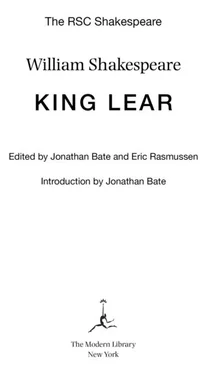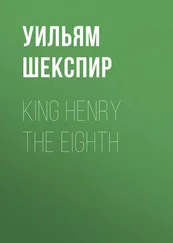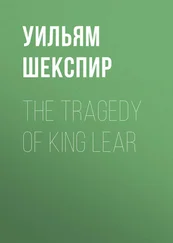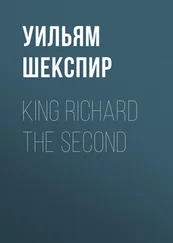уильям шекспир - King Lear
Здесь есть возможность читать онлайн «уильям шекспир - King Lear» весь текст электронной книги совершенно бесплатно (целиком полную версию без сокращений). В некоторых случаях можно слушать аудио, скачать через торрент в формате fb2 и присутствует краткое содержание. Год выпуска: 2011, ISBN: 2011, Издательство: Random House Publishing Group, Жанр: Старинная литература, на английском языке. Описание произведения, (предисловие) а так же отзывы посетителей доступны на портале библиотеки ЛибКат.
- Название:King Lear
- Автор:
- Издательство:Random House Publishing Group
- Жанр:
- Год:2011
- ISBN:978-1-58836-828-7
- Рейтинг книги:3 / 5. Голосов: 1
-
Избранное:Добавить в избранное
- Отзывы:
-
Ваша оценка:
- 60
- 1
- 2
- 3
- 4
- 5
King Lear: краткое содержание, описание и аннотация
Предлагаем к чтению аннотацию, описание, краткое содержание или предисловие (зависит от того, что написал сам автор книги «King Lear»). Если вы не нашли необходимую информацию о книге — напишите в комментариях, мы постараемся отыскать её.
King Lear — читать онлайн бесплатно полную книгу (весь текст) целиком
Ниже представлен текст книги, разбитый по страницам. Система сохранения места последней прочитанной страницы, позволяет с удобством читать онлайн бесплатно книгу «King Lear», без необходимости каждый раз заново искать на чём Вы остановились. Поставьте закладку, и сможете в любой момент перейти на страницу, на которой закончили чтение.
Интервал:
Закладка:
Edgar slays Oswald by breaking his back with a staff, and the fraternal duel between Edgar and Edmund is a bare-chested, bloody, unchivalric combat that ends with Edmund’s head being dumped in water. Even at the last the characters look out into the future in a spirit of skeptical uncertainty. 57
In Peter Brook’s vision of the play chaos was part of the natural order. His production emphasized the inhumanity and disinterestedness of the forces that annihilate Lear. There was no moral structure beneath the surface of civilization: “Everywhere one looks, one sees only the facades and emblems of a world and, ironically, as characters acquire sight, it enables them to see only into a void.” 58
Brook removed key moments of redemption and humanity: the servants did not tend Gloucester after he has been blinded but callously bumped into him as they cleared away the stage. Edmund’s attempt to redeem himself and stop the order that will see the death of Cordelia was cut. As Lear died, his final words “Look there” were spoken as he stared ahead into nothingness. We were not left with the usual tableau of survivors grieving over Lear and Cordelia. The cast left, carrying out their dead bodies, leaving Edgar and the dead Edmund on stage alone. Edgar moved center-stage, and then went to his brother. As he dragged his brother’s corpse up toward the back of the stage a distant rumble of thunder sounded in the background, leaving the audience with the impression that worse was to follow. “[W]e that are young / Shall never see so much nor live so long” took on a genuinely apocalyptic meaning. This was an image of the horror of “the promised end” of the world.
Where Brook’s production succeeded was in making the audience grieve for humanity, or more specifically for the absence of humanity. It seemed a fitting statement for its time, and it is one that still touches us today. Lear’s speech in the hovel is central to Brook’s vision—it is not by chance that he used this quote in the program for the production’s world tour: “Expose thyself to feel what wretches feel.” Corin Redgrave, who played King Lear in 2004, also took this line:
The play investigates how, in a dying or decaying world, we can live better and be better toward one another. It can’t produce any conclusions to that because the world as Shakespeare saw it at that time was dying, just as our world as we see it is dying. Shakespeare was writing in a world which he sees going to hell on wheels and writing a text book in case the world should ever recover. So it is the most bleak of plays, but it is a very salutary play, a very necessary play … you could not possibly lose King Lear without impoverishing ourselves terribly. 59
THE DIRECTOR’S CUT: INTERVIEWS WITH ADRIAN NOBLE, DEBORAH WARNER, AND TREVOR NUNN
Adrian Noble, born in 1950, arrived at the RSC from the Bristol Old Vic, where he had directed several future stars in productions of classic plays. His first production on the main stage of the Royal Shakespeare Theatre in Stratford was the acclaimed 1982 Lear , discussed here, with Michael Gambon as the king and Antony Sher as an extraordinarily powerful Fool. Two years later his Henry V sowed the seed for Kenneth Branagh’s film. Among his other major productions during his two decades at the RSC were Hamlet , again with Branagh in the title role, The Plantagenets , based on the Henry VI/Richard III tetralogy, and the two parts of Henry IV , with Robert Stephens as Falstaff. Stephens returned in 1993 to play Lear in a second production of the tragedy, also discussed here. Noble’s 1994 Midsummer Night’s Dream was made into a film. He was artistic director from 1991 to 2003, since when he has been a freelance director. His production style is characterized by strong use of colors and objects (such as umbrellas), and fluid scenic structure.
Deborah Warner, born in 1959, trained in stage management at the Central School of Speech and Drama. At the age of twenty-one she formed her own “fringe” company, Kick Theatre, imaginatively staging stripped-down productions of the classics, including King Lear (1985, discussed here), at the Edinburgh Festival. In 1987 she made her RSC debut with a rigorously simple but deeply moving Titus Andronicus , starring Brian Cox, on the intimate stages of the Swan at Stratford and The Pit at London’s Barbican. A King John in a similar style followed the next year and in 1990 she directed King Lear , again with Brian Cox, on the proscenium Lyttelton stage of the National Theatre in London (also discussed here). She has subsequently specialized in Samuel Beckett and opera, but has returned to Shakespeare with a Richard II at the National, featuring her collaborator Fiona Shaw cross-dressed in the title role, and a large-scale Julius Caesar at the Barbican.
Sir Trevor Nunnis the most successful and one of the most highly regarded of modern British theater directors. Born in 1940, he was a brilliant student at Cambridge, strongly influenced by the literary close reading of Dr. F. R. Leavis. At the age of just twenty-eight he succeeded Peter Hall as artistic director of the RSC, where he remained until 1978. He greatly expanded the range of the company’s work and its ambition in terms of venues and touring. He also achieved huge success in musical theater and subsequently became artistic director of the National Theatre in London. His productions are always full of textual insights, while being clean and elegant in design. Among his most admired Shakespearean work has been a series of tragedies with Ian McKellen in leading roles: Macbeth (1976, with Judi Dench, in the dark, intimate space of The Other Place), Othello (1989, with McKellen as Iago and Imogen Stubbs as Desdemona), and King Lear (2007, in the Stratford Complete Works Festival, on world tour, and then in London).
One of the first questions one always wonders about with King Lear is: What do you decide on as a setting for the play? We’ve seen everything from a Stonehenge-like world to contemporaneity by way of Samurai Japan. So what kind of a world did you and your designer seek to create?
Noble:There are two or three driving forces in relation to the setting. First of all there is the need to create a series of credible family units, because the dynamic of the play emanates from damaged families; in particular Lear’s and Gloucester’s two parallel families. So one needs to be able to create a domesticity and parallel familial worlds. The second thing one needs to be able to explore is an epic quality, by which I mean the fact that the reality we live in fractures and splinters as the reality inside Lear’s head fractures and splinters. Shakespeare quite deliberately expresses the horrors and the madness that are happening inside the human being through the physicality of it.
In both productions I sought for a setting and a world that could fragment and start behaving in an almost independent way. With both productions the walls started splitting and almost exploded apart. In 1993 with Robert Stephens as Lear I found an image at the very end of the first act which I felt was rather telling: the moon started bleeding sand. That seemed to me an exquisitely painful image, with the moon’s very strong connection with the eye. The milk of human kindness had completely disappeared.
I found myself eschewing a completely modern, contemporary world, because it seemed to me that would quite swiftly become a highway to nowhere. In a similar way I eschewed the old Stonehenge version which seemed to me as silly as setting it in Wapping. So we found a world that probably related to Europe a hundred and fifty years ago, with greatcoats, where people still hunted, where the motor vehicle hadn’t taken over our world. Neither myself, Bob Crowley, who designed the first, or Anthony Ward, who designed the second, would I think be able to place it within fifty years of a particular date.
Читать дальшеИнтервал:
Закладка:
Похожие книги на «King Lear»
Представляем Вашему вниманию похожие книги на «King Lear» списком для выбора. Мы отобрали схожую по названию и смыслу литературу в надежде предоставить читателям больше вариантов отыскать новые, интересные, ещё непрочитанные произведения.
Обсуждение, отзывы о книге «King Lear» и просто собственные мнения читателей. Оставьте ваши комментарии, напишите, что Вы думаете о произведении, его смысле или главных героях. Укажите что конкретно понравилось, а что нет, и почему Вы так считаете.












